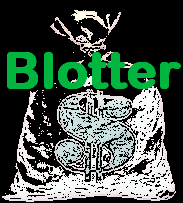 On May 17, 2011, Matthew “Matt” O’Neill, 52, entered a post office in Kremmling, Colo., and “filled out documents for certified or registered mail,” federal prosecutors said.
On May 17, 2011, Matthew “Matt” O’Neill, 52, entered a post office in Kremmling, Colo., and “filled out documents for certified or registered mail,” federal prosecutors said.
O’Neill, though, did not immediately put his envelope in the mail. Instead, he left the post office and “reentered several times before finally mailing” it, prosecutors said.
By May 25, a mail-room employee of the Colorado Department of Revenue had begun the typical process of opening the envelope, stapling the documents inside and routing it to the intended recipient, prosecutors said.
After placing the envelope on her desk, the recipient observed “white powder” falling out onto her work space. She then took the contents to another office, informed a colleague about the suspicious substance — and the two employees placed the contents on the desk, left the office and locked the door.
They next informed the Revenue Department floor manager, who immediately dialed 9/11 and contacted the Colorado State Patrol. Fearing they’d been exposed to a biological or chemical substance, the two employees tried to decontaminate themselves by washing their hands, prosecutors said.
More moments of high anxiety followed as the employees waited for the Denver Fire Department and the HAZMAT team to arrive. Practically every adult in America understands the horror caused when powdered substances spill out of envelopes. In September 2011 — about a week after the 9/11 terrorist attacks — the anthrax attacks began through the mail.
Five people died. Seventeen became infected. One of the largest investigations in U.S. history began.
When the fire department and HAZMAT team arrived at the Revenue Department, first responders — necessarily expecting the worst — took precautions with clothing and equipment and entered the building. An evacuation of people ensued.
It was not the first time the Revenue Department had heard from Matthew O’Neill.
As the probe continued, investigators learned that O’Neill had “sent several documents that express his views as a sovereign citizen, and that he believes that he does not have to pay state or federal taxes.”
O’Neill pleaded guilty this week to providing false information related to a terrorism offense for his mailing of the white powder, which proved to be baking soda but nevertheless caused fear to spread and left employees wondering if they’d lose their limbs or perhaps even their lives.
“Those who mail a threat, especially one containing material simulating a biological or chemical agent, will face felony criminal consequences,” said U.S. Attorney John Walsh.
“All threatening communications are taken seriously, the recipient of these types of threats cannot determine the true nature of the implied, or stated danger,” said James Yacone, special agent in charge of the FBI’s Denver office. “The FBI wants to remind everyone that mailing a threatening communication that contains a hoax of any kind in a parcel will be aggressively investigated. We will continue to respond to such threats, along with our federal, state, and local law enforcement partners, through the combined resources of the Joint Terrorism Task Force.”
Whether the power was harmful was not the issue, said the region’s top postal inspector.
Threatening mailings “not only constitute a federal crime, but cause alarm to victims and victim institutions,” said Tommy Coke, acting postal inspector in charge of the Denver Division of the U.S. Postal Inspection Service.
Sentencing for O’Neill before U.S. District Judge Marcia S. Krieger is set for June 4. He potentially faces up to five years in federal prison and a fine of up to $250,000.
Some “sovereign citizens” have attempted to use the mail to instill fear among judges, prosecutors, investigators, litigation opponents, community officials and taxing authorities.